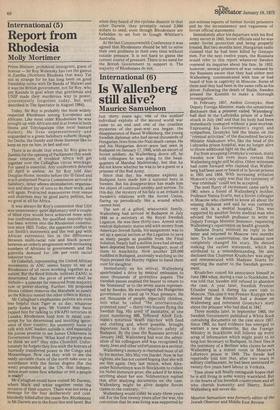International (5)
Report from Rhodesia
Molly Mortimer
Prime Minister, prohibited immigrant, guest of honour — Sir Roy Welensky has run the gamut in Zambia (Northern Rhodesia that was). Yet not so strange for he has long been on good friendship terms with Dr Banda of Malawi and it was the British government, not Sir Roy, who put Kaunda in goal when that gentleman and UNIP made their murderous way to power, (conveniently forgotten today, but well described in The Spectator in August 1964).
Today, Sir Roy is probably the most widely respected Rhodesian among Europeans and Africans. Like most older Rhodesians he was brought up with Africans and is at home in both Shona and Tchylapalapa (the local bastard dialect). He lives unpretentiously and unguarded in a green Salisbury suburb; though the Dachs, the Dandy and three Siamese like to keep an eye on him, in bed and out.
There is no doubt that when Sir Roy goes to Zambia for the opening of Parliament this week these veterans of troubled Africa will get together over the Callaghan circus wreckage. For speed is essential. Any conference delayed till April is useless. As Sir Roy told Alec Douglas-Home, months before the ill-fated and much postponed Pearce Commission arrived in Salisbury, delay allows intimidation, organisation and sheer joy of veto to do their work; and will again. Protracted manoeuvres over venue and chairman may be good party politics, but no good at all for Africa.
It was always Sir Roy's contention that UDI was unnecessary: quiet diplomacy and a couple of blind eyes would have achieved more with less confrontation, for qualified majority rule has been written into the Rhodesian constitution since 1923. Today, the apparent conflict in Ian Smith's statements and the real gap with African extremists lies in the difference Wetween multi-racial rule and black power; between an orderly progression with increasing numbers of Africans in government, and the guerrilla demand for 100 per cent racial takeover now.
Dr Gabellah, representing the United African movements in ANC seems happy to see all Rhodesians of all races working together as a nation. But the Revd Sitho/e, militant ZANU, is determined that the pivot of power shall be Sithole— a concept far removed from majority rule or power-sharing. Further, his proposed Shona cabinet removes the Matabele as surely as the Kikuyu ousted the other tribes in Kenya.
Mr Callaghan's elephantine politics are even less helpful than Tiger in its day, whatever party kudos he gets. Mr Vorster may have rapped him for talking to SWAPO terrorists.in Lusaka; Rhodesians hold him in equal contempt for his determined and insulting ignorance of their country, his unseemly haste to talk with ANC leaders outside it, and especially his jocose promise to see James Chikerema in Government House. 'What kind of people does he think we are?' they echo Churchill. Unfortunately he forgets they live with the horrors of hurriedly transferred power in the Congo and Mozambique. How can they wish to see the seedy unviable chaos of the north take over in accordance with the Soviet dogma (for the west) propounded at the UN, that independence must come first whether or not a people is ready? , Mr Callaghan could have visited Mt Darwin, where black and white together resist the invasion of their country. There was not even a message for the four deliberately and coldbloodedly killed after the cease-fire. Rhodesians in Mt Darwin are in the front line and beset. But when they heard of the cyclone disaster in that other Darwin, they promptly raised 2,000 dollars to send, even though Rhodesians are forbidden to set foot in Gough Whitlam's Australia.
At the last Commonwealth Conference it was agreed that Rhodesians should be left to solve their own problems in their own time without outside pressure. It is not hard to guess the current source of pressure. There is no need for the British Government to support it. The majority of Rhodesians do not.


































 Previous page
Previous page